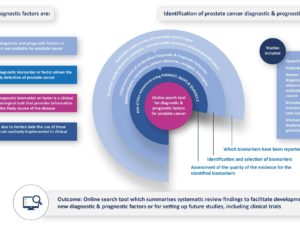
In an important step forward the first datasets have been transferred into the PIONEER Big Data platform by PIONEER partner Erasmus University Medical Centre (MC). Through the application of Big Data and the analyses of real-world evidence PIONEER aims to change the prostate cancer landscape to improve the health and social care received by all prostate cancer patients and their families.
Erasmus MC have uploaded two of the most well-known European datasets to the PIONEER Big Data platform:
- The Prostate Cancer Research International Active Surveillance (PRIAS) study which was initiated in 2006 and has developed into the largest active surveillance study worldwide, with more than 8000 patients from 120 centres in 18 countries. From its conception PRIAS aimed to represent a more real-world situation increasing the generalisability of its results. The primary objective of PRIAS is to provide evidence-based recommendations on how to select and follow men with low-risk prostate cancer on active surveillance.
- The European Randomised study of Screening for Prostate Cancer (ERSPC) Rotterdam. ERSPC was initiated in 1993 and is the largest ever randomised study on screening for prostate cancer, involving 184,000 men in eight countries. The Netherlands patient cohort from Erasmus MC contains more than 42,000 patients. The aim of ERSPC is to investigate the effect of regular prostate-specific antigen (PSA) screening on prostate cancer mortality.
Listen to Monique Roobol, from Erasmus MC, explain why she believes contributing data to PIONEER is of critical importance:
Gaining momentum: The second wave of data for upload to the PIONEER Big Data platform has already been prioritised and is ready for mapping.
PIONEER partner Lund University have contributed two comprehensive Swedish datasets. The Malmö Preventative Project, a 16 year screening study in the middle-aged population of Malmö including 22,444 men and the Malmö Diet Cancer dataset, an ongoing prospective cohort study including 53,000 participants of which 42% are male the aim of the study is to clarify whether diet is associated with certain forms of cancer whilst taking other life-style factors into account.
These harmonised datasets will be used to begin to answer PIONEER’s first prioritised research question – What are the relevant tumour-specific and patient-specific variables that affect prognosis of prostate cancer patients suitable for active surveillance? However, these four datasets are just the beginning. PIONEER partners are ready to contribute more than 22 anonymized datasets to the PIONEER Big Data Platform. Big Data analytics will be run over the lifetime of the project to take account of gradually added and updated datasets.
These milestones could not have been achieved without the invaluable work of PIONEER partner The Hyve who set up both the OMOP/OHDSI platform for population-based registries and epidemiological research and the PIONEER omics analysis platform for cohort and clinical trial data.
PIONEER hope that this collaborative sharing of data will act as a catalyst for other data custodians, both private and public, to contribute data to the PIONEER platform and join PIONEER’s effort to improve the health and social care received by all prostate cancer patients and their families.
“Together we can ensure each individual patient receives the right treatment for them at the right time.”







